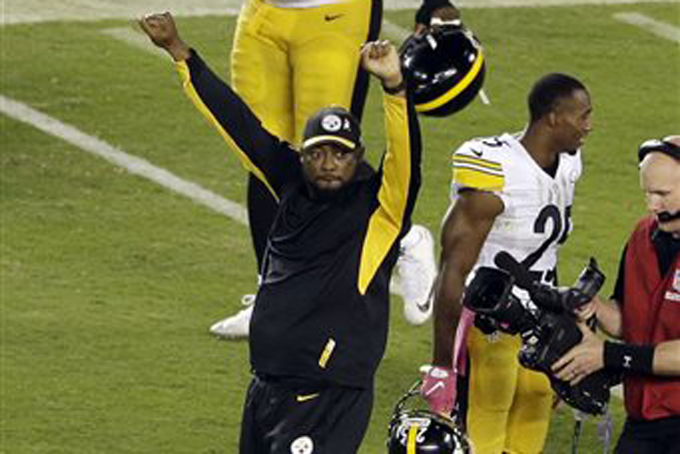
For the second week in a row, the NFL is acknowledging an officiating error during a nationally televised game.
This time, the problem was twofold: 18 seconds were incorrectly run off the clock late in the fourth quarter of the Pittsburgh Steelers’ 24-20 victory at the San Diego Chargers — and not one of the game officials noticed the gaffe and corrected it.
In a statement emailed Tuesday, league spokesman Michael Signora said that “an error by the clock operator” after a touchback allowed the extra time to tick away, and “it is the responsibility of the side judge to supervise the timing of the game.”
The statement added: “Had the side judge or any of the other six on-field officials noticed the timing error, they could have corrected it.”
In last week’s Monday night game, an official missed a late-game call in Seattle’s 13-10 victory over Detroit, giving the Seahawks the ball even though one of their defenders knocked a fumbled ball out of the end zone, which should be a penalty.
The most recent mistake happened after San Diego kicked a field goal to take a 20-17 lead with 2 minutes, 56 seconds left Monday night. The ensuing kickoff went for a touchback, so the clock never should have started. Instead, it rolled down, and by the time Pittsburgh lined up for the first play of its crucial drive, only 2:38 remained.
As it turns out, the Steelers managed to make it all the way downfield in time to score the go-ahead points on the final play from scrimmage, a 1-yard TD run by Le’Veon Bell. So, not surprisingly, Pittsburgh coach Mike Tomlin’s take, essentially, was: All’s well that ends well.
“It didn’t define the outcome of the game,” Tomlin said Tuesday, “so I’m moving on with my work week.”
The truth is, of course, there really is no way to know how the outcome of the game could have been different had those extra 18 seconds not been “lost.” Perhaps San Diego would have been left with enough time for a play or two — or a kickoff return for a TD. Or perhaps Pittsburgh would have called things differently on offense with more room on the clock, maybe running time down to nothing, anyway.
Who knows?
Signora’s statement noted: “The performance of the clock operator and game officials will be reviewed per the standard procedure for reviewing every play of every game.”
Each game-clock operator is hired by the league, not the home team, and lives near the stadium hosting a regular-season game. In the playoffs, the league uses operator who don’t live in the area.
“We proceed with the assumption,” Tomlin said, “the clock is going to be managed properly.”
___
AP Sports Writer Will Graves in Pittsburgh contributed to this report.
___
Online:
AP NFL website: www.pro32.ap.org and AP NFL Twitter feed: www.twitter.com/AP_NFL
___
Follow Howard Fendrich on Twitter at https://twitter.com/HowardFendrich
This time, the problem was twofold: 18 seconds were incorrectly run off the clock late in the fourth quarter of the Pittsburgh Steelers’ 24-20 victory at the San Diego Chargers — and not one of the game officials noticed the gaffe and corrected it.
In a statement emailed Tuesday, league spokesman Michael Signora said that “an error by the clock operator” after a touchback allowed the extra time to tick away, and “it is the responsibility of the side judge to supervise the timing of the game.”
The statement added: “Had the side judge or any of the other six on-field officials noticed the timing error, they could have corrected it.”
In last week’s Monday night game, an official missed a late-game call in Seattle’s 13-10 victory over Detroit, giving the Seahawks the ball even though one of their defenders knocked a fumbled ball out of the end zone, which should be a penalty.
The most recent mistake happened after San Diego kicked a field goal to take a 20-17 lead with 2 minutes, 56 seconds left Monday night. The ensuing kickoff went for a touchback, so the clock never should have started. Instead, it rolled down, and by the time Pittsburgh lined up for the first play of its crucial drive, only 2:38 remained.
As it turns out, the Steelers managed to make it all the way downfield in time to score the go-ahead points on the final play from scrimmage, a 1-yard TD run by Le’Veon Bell. So, not surprisingly, Pittsburgh coach Mike Tomlin’s take, essentially, was: All’s well that ends well.
“It didn’t define the outcome of the game,” Tomlin said Tuesday, “so I’m moving on with my work week.”
The truth is, of course, there really is no way to know how the outcome of the game could have been different had those extra 18 seconds not been “lost.” Perhaps San Diego would have been left with enough time for a play or two — or a kickoff return for a TD. Or perhaps Pittsburgh would have called things differently on offense with more room on the clock, maybe running time down to nothing, anyway.
Who knows?
Signora’s statement noted: “The performance of the clock operator and game officials will be reviewed per the standard procedure for reviewing every play of every game.”
Each game-clock operator is hired by the league, not the home team, and lives near the stadium hosting a regular-season game. In the playoffs, the league uses operator who don’t live in the area.
“We proceed with the assumption,” Tomlin said, “the clock is going to be managed properly.”
___
AP Sports Writer Will Graves in Pittsburgh contributed to this report.
___
Online:
AP NFL website: www.pro32.ap.org and AP NFL Twitter feed: www.twitter.com/AP_NFL
___
Follow Howard Fendrich on Twitter at https://twitter.com/HowardFendrich